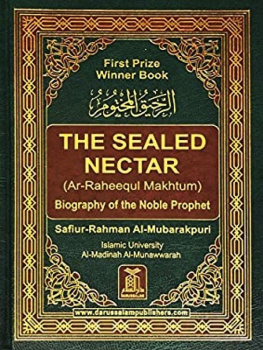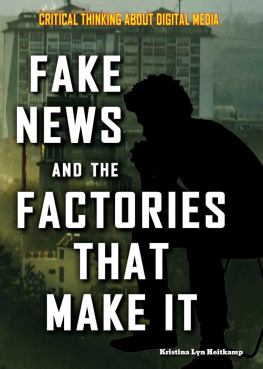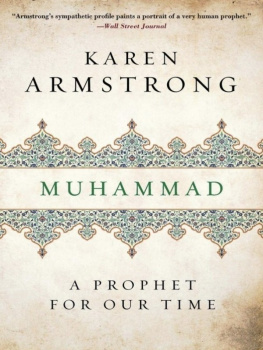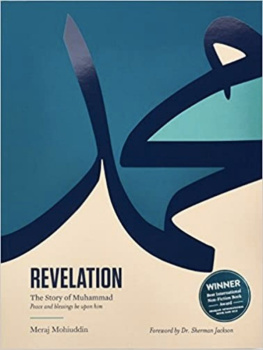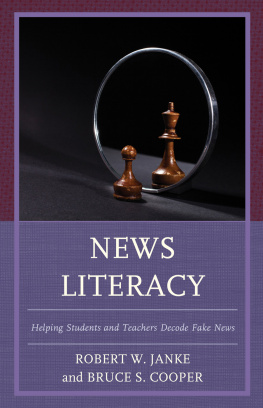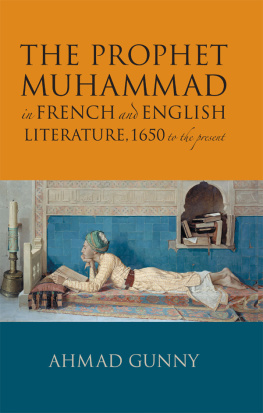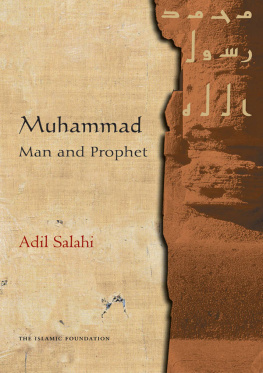Fake book to discredit Prophet Muhammad.
Here you can read online Fake book to discredit Prophet Muhammad. full text of the book (entire story) in english for free. Download pdf and epub, get meaning, cover and reviews about this ebook. year: 2020, publisher: Dar-us-Salam Publications, genre: Religion. Description of the work, (preface) as well as reviews are available. Best literature library LitArk.com created for fans of good reading and offers a wide selection of genres:
Romance novel
Science fiction
Adventure
Detective
Science
History
Home and family
Prose
Art
Politics
Computer
Non-fiction
Religion
Business
Children
Humor
Choose a favorite category and find really read worthwhile books. Enjoy immersion in the world of imagination, feel the emotions of the characters or learn something new for yourself, make an fascinating discovery.
Fake book to discredit Prophet Muhammad.: summary, description and annotation
We offer to read an annotation, description, summary or preface (depends on what the author of the book "Fake book to discredit Prophet Muhammad." wrote himself). If you haven't found the necessary information about the book — write in the comments, we will try to find it.
Unknown: author's other books
Who wrote Fake book to discredit Prophet Muhammad.? Find out the surname, the name of the author of the book and a list of all author's works by series.
Fake book to discredit Prophet Muhammad. — read online for free the complete book (whole text) full work
Below is the text of the book, divided by pages. System saving the place of the last page read, allows you to conveniently read the book "Fake book to discredit Prophet Muhammad." online for free, without having to search again every time where you left off. Put a bookmark, and you can go to the page where you finished reading at any time.
Font size:
Interval:
Bookmark:
The Sealed Nectar
Biography of the Prophet (PBUH)
Safiur Rahman Mubarakpuri
Dar-us-Salam Publications
Beyond a shadow of doubt, the biography of Prophet Muhammad (May the peace and blessings of Allah be upon him) represents a complete picture of the magnificent Divine Message that he communicated in order to deliver the human race from the swamp of darkness and polytheism to the paradise of light and monotheism. An authentic and comprehensive image of this Message is therefore only attainable through careful study and profound analysis of both the background and issues of such a biography. In view of this, a whole chapter is introduced here about the nature and development of Arab tribes prior to Islam as well as the circumstances and environment that surrounded the Prophets mission.
Linguistically, the word ``Arab means deserts and barren land without water and vegetation. Ever since the dawn of history, this term has been used for the Arabian Peninsula and its people.
The Arabian Peninsula is enclosed in the west by the Red Sea and Sinai, in the east by the Arabian Gulf, in the south by the Arabian Sea, which is an extension of the Indian Ocean, and in the north by Shaam (ancient Syria) and parts of Iraq. The area is estimated between one million and one million and three hundred thousand square miles.
Thanks to its geographical position, the peninsula has always had great strategic importance. Considering its internal features, it comprises mostly deserts and arid areas, which made it inaccessible to foreigners and invaders and allowed its people complete liberty and independence through the ages, despite the presence of two neighboring great empires.
Its external setting, on the other hand, caused it to be the center of the ancient world and provided it with sea and land links with most nations at the time. Thanks to this strategic position, the Arabian Peninsula became a center for trade, culture, religion and art.
Other Mental Disorders
Physical Ailments
Chapter One

Your Lord has not forsaken you, nor does He hate you. The future will be better for you than the past. And soon your Lord will give you so that you will be content. Did He not find you an orphan and give you shelter? Did He not find you wandering and guide you? Did He not find you in need and enrich you? (Q. 93:3-8)
Let us begin with Muhammads story. Who was he and what were the circumstances that influenced his thinking? In this chapter we will briefly go through the salient points of the life of a man, whom over a billion people literally worship. Islam is Muhammadism. Muslims claim that they worship no one but Allah. Since Allah was Muhammads alter ego, in practice, its him whom they worship. Islam is the personality cult of one man. We will read his words as they were dictated in the Quran, claimed by him to be the words of God, and see him through the eyes of his companions and wives. We will take a look at how he rose from a derelict preacher to become the de facto ruler of Arabia in just a decade. We will focus on how he divided people in order to control them, how he instilled sedition, hate, and roused some to wage war against others. And, how he used raids, rape, torture, and assassinations to cast terror in the hearts of his victims and subdue them. We will learn about his genocides and his penchant for deception as a strategy, the very strategy used by Muslims today, to take over the world. By the time you finish reading this chapter, you will come to see that the terrorists are doing exactly what their prophet did.
In the year 570 A.D., in Mecca , Arabia, a widowed young woman named Amina, gave birth to a boy whom she called Muhammad. Though Muhammad was her only child, Amina gave him to a Bedouin woman, to be raised in the desert when he was only six months old.
Some wealthy Arab women hired wet nurses for their infants. This allowed them to have another child right away. More children meant higher status. However, that was not the case with Amina who was not wealthy and a widow with only one child to care for. Abdullah, Muhammads father, had died six months before his birth. Also, this practice was not really that common. Khadijah, the first wife of Muhammad, who was the wealthiest woman of Mecca, had three children from her previous two marriages and bore six more to Muhammad. She raised them all on her own.
Why would Amina give away her only child to be raised by someone else? She also did not breastfeed her infant. After his birth, Muhammad was given to Thueiba, a maid of his uncle Abu Lahab, (the same uncle whom Muhammad cursed in Sura 111) to be nursed. Why Amina did not nurse her child is not mentioned. All we can do is to speculate. Was she depressed? Did she think the child was an impediment to the possibility of remarriage?
A death in the family can lead to depression. Other factors that may increase a womans chances of depression are: living alone, anxiety about the fetus, marital or financial problems, and the young age of the mother.
Some researchers suggest that depression in pregnant women can have direct effects on the fetus. Their babies are often irritable and lethargic. These newborns may grow into infants who become slow learners, and emotionally unresponsive, with behavior problems, such as aggression.
Muhammad grew up among strangers. As he grew, he became aware that he did not belong to those people. He could see that other children had parents. Why his mother, whom he visited twice a year, did not want him? Maybe other children also belittled him for being an orphan. Being an orphan is a stigma in those lands even today.
Several decades later, Halima , Muhammads wet nurse recounted that at first she did not want to take the child for he was an orphan of a poor widow. She accepted him because she didnt find a child from a wealthier family, and she didnt want to return with no child, while her friends had all found a baby to foster. Did this reflect in the way she cared for the child? Did Muhammad feel unloved in his foster familys home during those crucial formative years when a persons character is shaped?
Halima reported that Muhammad was a solitary child. He would withdraw to an imaginary world and converse with friends that no one else could see. Was this a coping mechanism of a child who felt unloved in the real world and made up one in his mind, in which he was loved?
Muhammads mental health became a matter of concern to his foster parents who, when he reached the age of five, took him back to Amina. Not having found a new husband yet, Amina was reluctant to take the child back, until Halima told her about his strange behavior. They had tried to return Muhammad since he was weaned at the age of two, but each time Amina insisted that they keep him longer. Ibn Ishaq has recorded Halimas words: His [Halimas own son] father said to me, I am afraid that this child has had a stroke, so take him back to his family before the result appears. She [Muhammads mother] asked me what happened and gave me no peace until I told her. When she asked if I feared a demon had possessed him, I replied that I did.
It is not unusual for children to have a wild imagination. Muhammads case must have been exceptionally alarming to concern Halima and her husband. He said, I am afraid that this child has had a stroke. Years later, Muhammad spoke of his strange childhood experiences. Two men in white clothes came to me with a golden basin full of snow. They took me and split open my body, then they took my heart and split it open and took out from it a black clot which they flung away. Then they washed my heart and my body with that snow until they made them pure.
Font size:
Interval:
Bookmark:
Similar books «Fake book to discredit Prophet Muhammad.»
Look at similar books to Fake book to discredit Prophet Muhammad.. We have selected literature similar in name and meaning in the hope of providing readers with more options to find new, interesting, not yet read works.
Discussion, reviews of the book Fake book to discredit Prophet Muhammad. and just readers' own opinions. Leave your comments, write what you think about the work, its meaning or the main characters. Specify what exactly you liked and what you didn't like, and why you think so.

